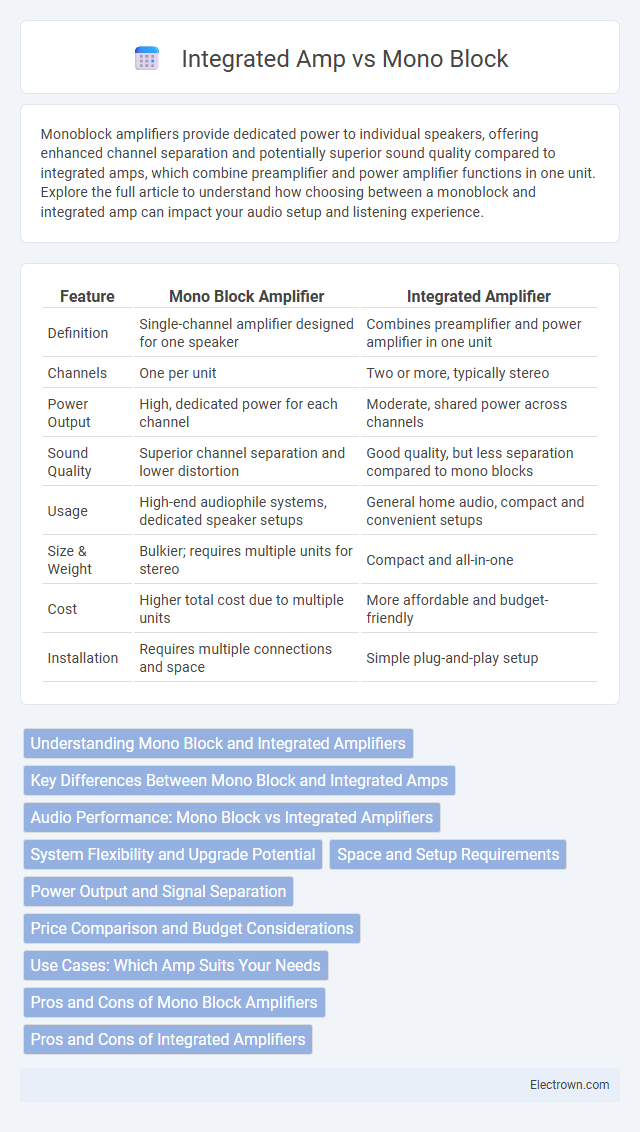Monoblock amplifiers provide dedicated power to individual speakers, offering enhanced channel separation and potentially superior sound quality compared to integrated amps, which combine preamplifier and power amplifier functions in one unit. Explore the full article to understand how choosing between a monoblock and integrated amp can impact your audio setup and listening experience.
Table of Comparison
| Feature | Mono Block Amplifier | Integrated Amplifier |
|---|---|---|
| Definition | Single-channel amplifier designed for one speaker | Combines preamplifier and power amplifier in one unit |
| Channels | One per unit | Two or more, typically stereo |
| Power Output | High, dedicated power for each channel | Moderate, shared power across channels |
| Sound Quality | Superior channel separation and lower distortion | Good quality, but less separation compared to mono blocks |
| Usage | High-end audiophile systems, dedicated speaker setups | General home audio, compact and convenient setups |
| Size & Weight | Bulkier; requires multiple units for stereo | Compact and all-in-one |
| Cost | Higher total cost due to multiple units | More affordable and budget-friendly |
| Installation | Requires multiple connections and space | Simple plug-and-play setup |
Understanding Mono Block and Integrated Amplifiers
Mono block amplifiers provide dedicated power amplification for each audio channel, delivering superior channel separation and reduced crosstalk, ideal for audiophiles seeking precise soundstage imaging. Integrated amplifiers combine a preamp and power amp in one unit, offering a convenient all-in-one solution that simplifies your audio setup and saves space. Choosing between mono block and integrated amplifiers depends on your system's complexity, audio performance goals, and budget constraints.
Key Differences Between Mono Block and Integrated Amps
Mono block amplifiers provide dedicated amplification for each audio channel, resulting in improved channel separation and reduced crosstalk compared to integrated amps, which combine a preamp and amplifier in a single unit. Mono blocks typically deliver higher power output and better heat dissipation, enhancing overall sound quality and performance for high-fidelity audio systems. Integrated amps offer convenience and space-saving design but may sacrifice the specialized performance and flexibility found in separate mono block setups.
Audio Performance: Mono Block vs Integrated Amplifiers
Mono block amplifiers deliver superior channel separation and reduced crosstalk, resulting in enhanced audio clarity and precision, especially in stereo systems. Integrated amplifiers, while combining preamp and power amp functions in one unit, may have slightly increased noise floor and less dedicated channel isolation, affecting overall soundstage depth. For audiophiles prioritizing immersive and high-fidelity sound reproduction, mono blocks typically outperform integrated amplifiers in dynamic range and signal purity.
System Flexibility and Upgrade Potential
Mono block amplifiers offer greater system flexibility by allowing individual channel customization and easier upgrades, making them ideal for expanding or refining a high-performance audio setup. Integrated amps combine preamp and power amplifier functions in a single unit, which simplifies connectivity but limits the potential for future upgrades and component swaps. Your choice depends on whether you prioritize modularity and scalability or a compact, streamlined system design.
Space and Setup Requirements
Mono block amplifiers require more physical space and complex wiring since each channel has its own separate unit, making setup more demanding and less compact. Integrated amplifiers combine preamp and power amp functions into a single chassis, significantly reducing space needs and simplifying setup with fewer connections. For small rooms or minimalist setups, integrated amps offer a cleaner, hassle-free arrangement without sacrificing performance.
Power Output and Signal Separation
Mono block amplifiers provide dedicated power output per channel, delivering higher wattage and improved headroom compared to integrated amps, which share power across channels. This separation minimizes crosstalk and distortion, enhancing signal clarity and dynamic range for each speaker. Integrated amplifiers combine preamp and power stages in a single chassis, often resulting in slightly compromised signal separation and lower maximum output levels.
Price Comparison and Budget Considerations
Mono block amplifiers generally cost more than integrated amps due to their dedicated channels and higher power output per unit, making them a pricier option for audiophiles seeking superior sound clarity. Integrated amps combine preamp and power amp functions into one device, offering a more budget-friendly solution without sacrificing overall audio performance for casual listeners. Your choice should consider not only the initial price but also the value derived from sound quality, flexibility, and future upgrade potential within your budget limits.
Use Cases: Which Amp Suits Your Needs
Mono block amplifiers provide dedicated power to each speaker channel, ideal for audiophiles seeking maximum sound clarity and high-power output in large or complex sound systems. Integrated amplifiers combine a preamplifier and power amplifier in one unit, offering convenience and space-saving benefits suitable for casual listeners or smaller home audio setups. Consider mono blocks for superior channel separation and minimal interference in professional or high-fidelity environments, while integrated amps fit perfectly for everyday use with moderate power demands and simpler installation.
Pros and Cons of Mono Block Amplifiers
Mono block amplifiers provide superior channel separation and dedicated power output for each speaker, resulting in enhanced sound clarity and dynamic range. Their isolated design reduces interference and crosstalk, improving overall audio fidelity, but they usually require more space and higher cost compared to integrated amps. Your choice depends on prioritizing audio performance versus convenience and budget constraints.
Pros and Cons of Integrated Amplifiers
Integrated amplifiers combine a preamplifier and power amplifier in one unit, offering streamlined setup and space-saving advantages for Your audio system. They provide convenience and cost-effectiveness compared to mono block amps but may sacrifice some channel separation and power headroom. Integrated amps excel in simplicity and affordability, though audiophiles seeking ultimate soundstage precision often prefer separate mono block units.
mono block vs integrated amp Infographic

 electrown.com
electrown.com